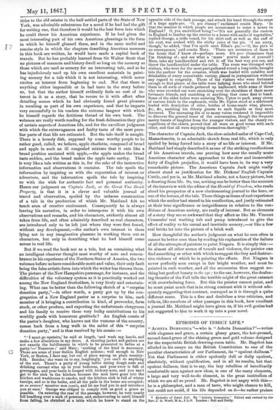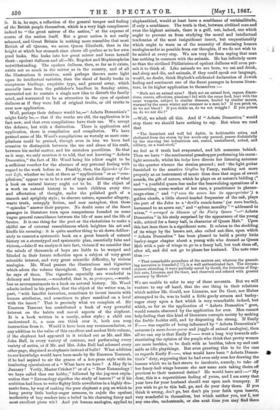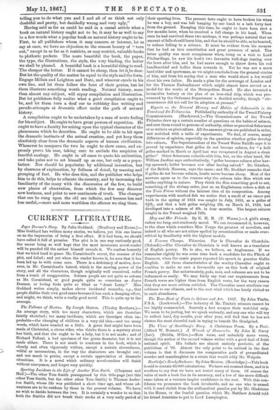EPISODES OF INSECT LIFE.*
" ACIIETA DOMESTICA"—who is " Acheta Domestic.a ?"—writes with elegance and grace, a certain glossy grace, the hot-pressed, second-hand grace of the shining green and gold volume designed for the respectable British drawing-room table. Mr. Bagehot has. alluded in his essays on the British Constitution to one of the peculiar characteristics of our Parliament, its "opulent dullness." Not that Parliament is either opulently dull or dully opulent, absolutely, without qualification, and in all its results, but that, opulent dullness, that is to say, the lazy rebellion of hereditarily comfortable men against new ideas, is one of the many elements, a large and very well-to-do element, in the great instituCion of which we are all so proud. Mr. Bagehot is not angry with this— he is a philosopher, and a man of taste, who might chance to kill, but could not scold, if his life depended on it—he rather praises • Episodes of Insect Ate. By "Acheta Domestica." Edited and revised by the Rev. J. 0. Wood, M.A., F.1.13. London : Bell and Middy. it. It is, he says, a reflection of the general temper and feeling of the British people themselves, which is a very high compliment indeed to "the great mirror of the nation," at the expense of course of the nation itself. But a great nation is not easily ashamed, and Great Britain in nothing more resembles that most British of all Queens, we mean Queen Elizabeth, than in the height at which her stomach rises above all qualms as to her own good looks. She looks into her great mirror and loves herself there— opulent dullness and all—Mr. Bagehot and Mephistopheles notwithstanding. The opulent dullness, then, so far as it exists, exists not so much in the mirror, as in the country, and of all the illustrations it receives, none perhaps throws more light upon its intellectual varieties, than the shoal of family books in sumptuous bindings, exquisite type, and general array, which annually issue from the publisher's bandbox in Sunday attire, warranted not to contain a single new idea to disturb the family mind, and warranted to be as attractive in the eyes of opulent dullness as if they were full of original truths, or old truths in ever new application.
Well, perhaps their defence would be,—" Aeheta Domestica's " might fairly be,— that if the truths are old, the application is in fact new, and that even compilations have their use. We accept the defence, but with a distinction. There is application and application, there is compilation and compilation. We have praised some of Mr. Wood's compilations as warmly as mere com- pilations could be praised, though even in him we have had occasion to distinguish between the use and abuse of his craft, between his useful matter, and his mistaken puerilities. Be that as it may, we only mention it to add, that not knowing " Aeheta Domestica," the fact of Mr. Wood being his editor ought to be a sufficient voucher for the absence of any personal feeling with regard to the work before us. Frankly, then, the Episodes of In- sect Life, whether we look at them as " applications " or as "com- pilations," appear to us to be a sort of type and dictionary of what a book on natural history ought not to be. If the object of a work on natural history is to teach children every vice and affectation of thought, under the polished garb of a smooth and sprightly style ; to obscure nature, squander allegory, waste truth, misapply fiction, and mar metaphor, then these -" episodes" answer their purpose. No doubt some of the finest .passages in literature turn upon comparisons founded on some vague general resemblance between the life of man and the life of brutes. It is one thing for the poet or the rhetorician to make a skilful use of external resemblances which heighten his art and kindle his meaning : it is quite another thing to sit down deliber- ately to concoct a systematic book on a great branch of natural 'history on a stereotyped and systematic plan, essentially false and vicious,—false if we analyze it into fact, vicious if we consider that the minds of thousands of boys are liable to be warped and blinded in their future reflection upon a subject of very great scientific interest, and very great scientific difficulty, by vicious analogies. Mr. Wood praises the illustrations and vignettes -which adorn the volume throughout. They deserve every word he says of them. The vignettes especially are wonderful in delicacy and humour, —wonderful, that is, as grotesques,—worth- less as accompaniments to a book on natural history. Mr. Wood admits indeed in his preface, that the object of the writer was, in part, "with fanciful invention, sometimes to invest insects with human attributes, and sometimes to place mankind on a level -with the insect." That is precisely what we complain of. Sir Emerson Tennent has contributed a book of very powerful interest on the habits and moral aspects of the elephant. It is a book written in a manly, sober style ; a child can understand it, a man can think over it, both can reap instruction from it. Would it have been any recommendation, or any addition to the value of this excellent and modest little volume, if the elephant had appeared in it tricked out as Mr. and Mrs. John Bull, in every variety of costume, and performing every variety of antics, or if Mr. and Mrs. John Bull had adorned every other page, disguised as elephants instead of bulls? What addition to our knowledge would have been made by Sir Emerson Tennent, if be had aspired to air the graces of a hot-press style with its lumbering ejaculations of a "What have we here ? A May fly in .January! Verily, Master Cricket?" or of a "Dear Entomology we hay() called thee our hobby," followed by the jog-trot expla- nation that "Entomology signifies the study of insects ?" or if his ambition had been to write flighty little novellettes in a highly dra- matic form, by way of making the poor elephant a peg on which to hang pretty little barley-sugar sermons, to cajole the opulent mediocrity of lazy readers into a belief in his charming fancy and most excellent pions wit? And yet human analogies, applied to
elephantkind, would at least have a semblance of verisimilitude, if only a semblance. The truth is that, between civilized man and even the highest animals, there is a gulf, not, indeed, one which ought to prevent us from studying the moral and intellectual tendencies of the most insignificant insect, but unquestionably which ought to warn us of the necessity of dismissing human analogies as far as possible from our thoughts, if we do not wish to be misled at every step. We are very far from saying that man has nothing in common with the animals. He has infinitely more so than the civilized Philistinism of opulent dullness will even per- mit it to think of. Like animals we are born, we eat and drink, and sleep and die, and animals, if they could speak our language, would, no doubt, think Shylock's celebrated declaration of Jewish feeling and sentiment one of the finest passages in human litera- ture, in its higher application to themselves :—
" Hath not an animal eyes ? Hath not an animal feet, organs, dimen- sions, senses, affections, passions ? fed with the same food, hurt with the same weapons, subject to similar diseases, healed by similar means, warmed by the same winter and summer as a man is? If you prick us, do we not bleed ? If you tickle us, do we not wriggle ? If you poison us, do we not die ?"
—Well, we admit all this. And if " Acheta Domestics" would stop there we should have nothing to say. But when we read that
"The luxuriant and well fed Aphis, in fashionable attire, and sheltered from the storm by her acorn-cup parasol, passes disdainfully by the starving but industrious ant, seated, unsheltered, naked, and solitary, on a toad-stool,"
we feel as if truth had evaporated, and left nonsense behind. Then we have " the sentimental grasshopper performing his moon- light serenade, whilst his ladye love directs her listening eaten= to the quarter whence the strains proceed ; and the light guitar furnished to the amative Gryllus by Fancy, ranking not more properly as an instrument of music than does that organ of sweet sounds, the gift of nature, which he plays on at nature's bidding ;" and "a youthful queen-bee under the benevolizing operations of a
mesmerizing nurse-worker of her race, a practitioner in phreno- maga etism ;" and " (' even the acorn has its appropriator') a golden cicada, a little shovel-headed frequenter of the oak, plays the part of the Jehu to a devil's coach-horse' (or rove beetle), harnessed to an acorn ear," and "sylvan morality" "addressed to wives," "arrayed in likeness of the Faery Queen "—" Acheta Domestics" in his study surprised by the appearance of the young wife, attired for a fancy ball, in character of Queen Mab." Upon
this last item there is a significant note. It relates to the shedding of its wings by the brown ant, also called ant-flies, upon which " Acheta Domestics" has been pleased to build a pretty little barley-sugar chapter about a young wife who dressed as Queen Mab with a pair of wings to go to a fancy ball, but took them off, after all, and did not go to please her husband. The note runs thus :—
" That remarkable procedure of the matron ant, whereon the preced- ing narrative is founded !!), is a well authenticated fact. The circum- stances attending it were partially noted by Gould, the historian of Eng- lish ants, Linnams, and De Geer, and observed and related with greater accuracy by Huber."
We are unable to refer to any of these accounts. But we will venture to say off hand, that the one thing in their relations which neither Mr. Gould, nor Linnazus, nor De Geer, nor Huber attempted to do, was to build a little goody sermon and barley- sugar story upon a fact which is very remarkable indeed, but which, so far as the application of " Acheta Domestics" goes, would remain obscured by the application for ever. Men cannot help feeling that this kind of literature corrupts society by making the feeble feebler still, and by disgusting the strong. If Emily F— was capable of being influenced by " Acheta Domestics's" sermons (a mere hocus-pocus and juggle of animal analogies), then all we can say is that Emily F— went a long way towards sub- stantiating the opinion of the people who think that pretty women are mere baubles, to be dealt with as baubles, taken up and cast aside as idle playthings. But even granting this to be the case as regards Emily F—, what would have been " Acheta Domes- tica's " duty, supposing that he had even only seen her drawing the lessons which we in fact strove to inculcate, namely, to take off her fancy-ball wings because she saw some ants taking theirs off previous to their maternal duties? He would have said :—" My dear, this is a superstitious feeling of yours, and I am sorry that your love for your husband should rest upon such trumpery. If you wish to go to this ball, go, and do your duty there. If you think it wrong, don't go, but don't pin your faith upon insects, very wonderful in themselves, but which neither you, nor I, nor any one else, understands, or else next time you may find them telling you to do what you and I and all of us think not only doubtful and pretty, but decidedly wrong and very ugly," Having said as far as could be said in a casual article what a book on natural history ought not to be, it may be as well to say in a few words what a popular book on natural history ought to be. First, to all publishers whom it may concern or interest, let us say at once, we have no objection to the utmost beauty of "turn out," except in so far as it restricts, or may restrict, valuable books to plethoric pockets. The more beautiful the book, the paper, the type, the illustrations, the style, the very binding, the better we shall be pleased. A beautiful book is a beautiful thing to read. The cheaper the better. If it cannot be cheap, then let it.be dear. But let the quality of the matter be equal to the style and the form. Engage Millais and Leighton and Dore, and whoever excels in his own line, and let them follow the bent of their genius, but let them illustrate something worth reading. Natural history, more than almost any subject, will repay compilation and illustration. But let publishers fully realize what a good compilation ought to be, and let them turn a deaf ear to rubbishy fine writing and pseudo-attempts at dramatic effect under the garb of natural history.
A compilation ought to be undertaken by a man of acute feeling for his subject. He ought to have great powers of exposition. He ought to have a faculty for seizing upon the typical character of the phenomena which he describes. He ought to be able to hit upon the dramatic instincts of the animal creation, and yet keep them absolutely clear from the dramatic aspects of human civilization. Whenever he compares the two he ought to show cause, and ex- pressly prove his case, taking care to exclude the suspicion of fanciful analogy. He ought in all cases to quote his authorities, and take pains not to set himself up as one, but only as a popu- larizer. Nor should he popularize by additional invention, but by clearness of explanation, by fullness of detail, by massing and frouping of fact. He who does this, and the publisher who helps him to do this, helps to educate the country, and by increasing the familiarity of the many with the discoveries of the few, to build new places of observation, from which the few may discover new horizons, and point to new continents of truth. The changes that can be rung upon the old are infinite, and become less and less useful,—more and more worthless the oftener we ring them.
































 Previous page
Previous page